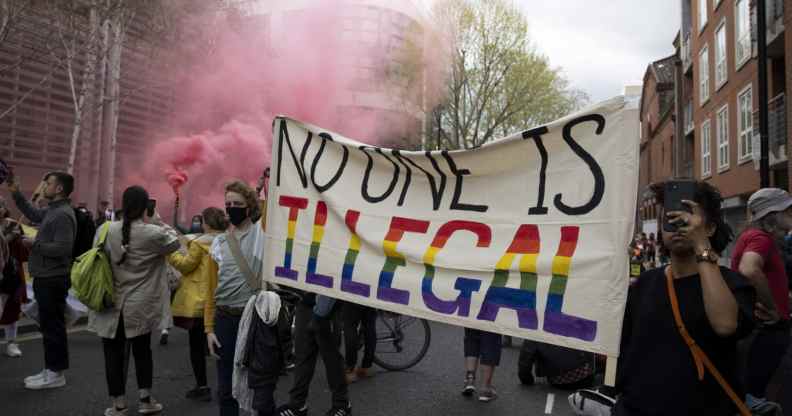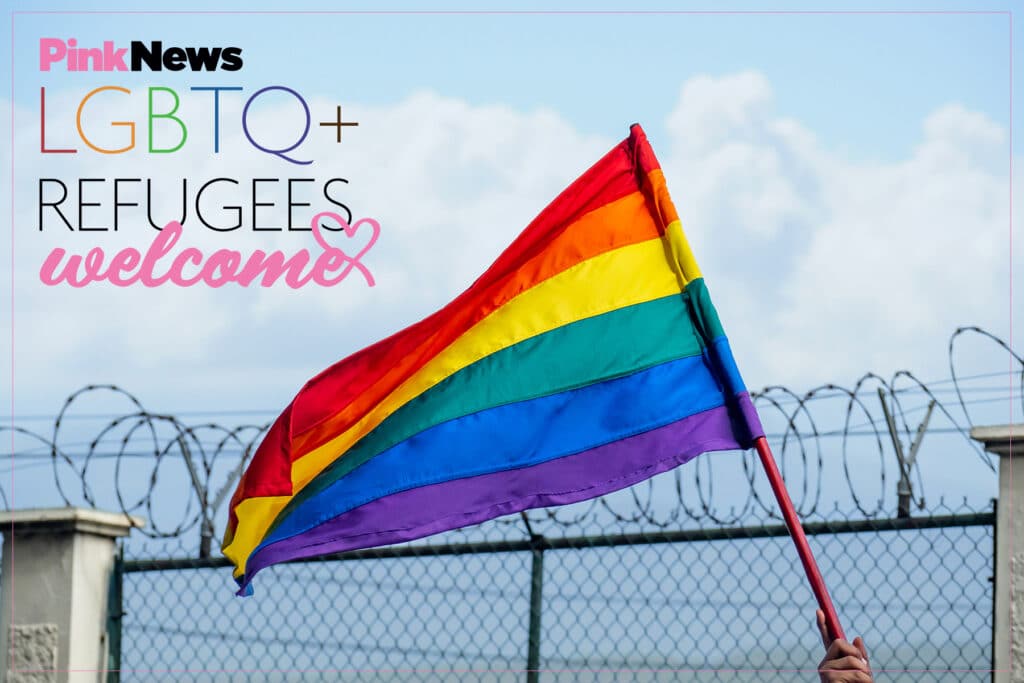The government’s shameful, invasive treatment of LGBTQ+ refugees shows why we still need Pride

Government plans to tighten immigration rules were met with fierce criticism. (Hesther Ng/SOPA Images/LightRocket via Getty Images)
Labour MP Olivia Blake reflects on the fight for LGBTQ+ refugee rights in the UK as Pride Month draws to a close.
Pride Month is rightly an opportunity to celebrate and make visible our community and the gains LGBTQ+ people have made. But it should also prompt reflection on the distance we have yet to travel in our journey for equality.
Whilst it is true that our struggle has come a long way, I have been reflecting on those LGBTQ+ people who have literally travelled a long way to be here – asylum seekers and refugees who have fled persecution for being who they are – to build a life here on the basis that the UK is safe.
Unfortunately the story isn’t always positive; in fact, the government has put up extra barriers for our LGBTQ+ refugee and asylum seeker siblings.
Our immigration and asylum system is an incredibly hostile environment for LGBTQ+ people. Those who seek safety here face invasive screening appointments in which they are asked to ‘prove’ their sexuality. The recent passage of the Nationalities and Borders Act has only increased this burden of proof.
The assumption that some people will try to “rig” the application process and pretend to be LGBTQ+ has led to a particularly callous and cruel process and an extra hurdle for refugees to prove their claims. The first time you may have told the truth about who you are to a stranger – having had to lie to protect your identity and the safety of your friends, partners and families – you are met with scepticism, suspicion, and people without adequate training to understand LGBTQ+ lived experience.
You may even use different language to describe yourself – language from your own culture which is unfamiliar to staff.
For many people, the challenge is impossible: it is a cruel and inhumane catch-22 to expect people who have spent their whole life destroying the evidence of their sexuality to be able to provide it in an impersonal interview room, in circumstances where they may have left home quickly, in fear of their lives, and after travelling many thousands of miles.
I’m sure many of us have experienced inappropriate and invasive questions as part of ingrained homophobia, transphobia and biphobia in our society, but to face this when you are fleeing persecution seems abhorrent to me – and it colludes in the persecution and trauma that refugees and asylum seekers are fleeing.

Labour MP Olivia Blake. (Parliament)
LGBTQ+ people are also at increased risk of harm if they end up in immigration detention and face deportation from the UK. Even though the government’s own policy suggests that detention should be used only for the shortest time necessary, there is no statutory upper limit on how long an individual can be held.
Many of those in detention will never be deported to their country of origin: in 2020, only 26 per cent were returned, showing that detention is more often than not unnecessary and only re-traumatises and isolates people from their communities.
In 2016, Rainbow Migration and Stonewall published their report ‘No Safe Refuge’ which found that while in detention, LGBTQ+ people seeking asylum face systemic discrimination, abuse and harassment from both staff and other detainees. Although the Adults at Risk policy specifically says that trans people should not be detained, this has happened in the past.
Again, this might be due to requirements to produce ‘professional evidence’ that they are trans, rather than allowing any form of self-declaration. The situation can lead to a vicious cycle for LGBTQ+ asylum seekers: they are reluctant to come out because they fear harassment and discrimination. But without coming out, they will not be able to provide evidence to the Home Office, putting their asylum claim at risk. I’m left to think how many legitimate claimants have been turned down because the system has put up barriers and instilled fear in those LGBTQ+ seeking refuge.
Clearly the Home Office must do more to recognise LGBTQ+ refugees as particularly vulnerable and make changes to its policies accordingly. At the moment, they do not even collect any information on how many people in detention have declared themselves to be LGBTQ+, making it impossible to monitor and scrutinise their situation. Organisations such as Rainbow Migration, who advocate on behalf of LGBTQ+ asylum seekers, have therefore called for a ban on detention for LGBTQ+ people, and joined the many civil society organisations who have called for a time limit of 28 days.
It seems particularly cynical, too, that this Pride Month also saw the first scheduled deportation flight to Rwanda. Although homosexuality is not criminalised there, many do not feel safe to come out due to fear of discrimination. Some LGBTQ+ people from Rwanda have even sought asylum in the UK based on discrimination linked to their sexual orientation.

The UK government is attempting to deport refugees to Rwanda. (Vuk Valcic/SOPA Images/LightRocket via Getty)
Luckily, thanks to the efforts of grassroots activists, campaign organisations and the detainee’s lawyers, the flight was grounded. However the home secretary seems determined to try again. The threat of deportation to Rwanda is just another way to make LGBTQ+ refugees in the UK feel unsafe.
The Home Office has a lot of work to do. It could start by ending detention for LGBTQ+ people and the wider hostile environment for all asylum seekers, refugees and migrants. Instead, we should focus our resources on providing safe and secure accommodation for people when they arrive, re-examining the thresholds of evidence required to make an application, and speeding up the asylum process so that refugees can begin to build new lives in the UK.
Policy and lawmakers cannot congratulate themselves on their comparative international record on LGBTQ+ rights if our own asylum and immigration systems are complicit in the trauma that LGBTQ+ people flee to be here. There can be no equality if there is no equality for all our community. That’s why this Pride Month I’ll be thinking of not only how far we have come, but of how we strive for an immigration and asylum system that treats all those who come to the UK with humanity, compassion, and basic human dignity – and that provides freedom for all those who flee persecution for who they are or who they love.
Olivia Blake is the Labour MP for Sheffield Hallam and the co-chair of the APPG on migration. She has been campaigning on LGBTQ+ asylum seekers and refugee rights. During the passage of the Nationality and Borders Bill she held a debate in parliament on the issue.
Please donate what you can to PinkNews LGBTQ+ Refugees Welcome campaign by visiting our GoFundMe page.


